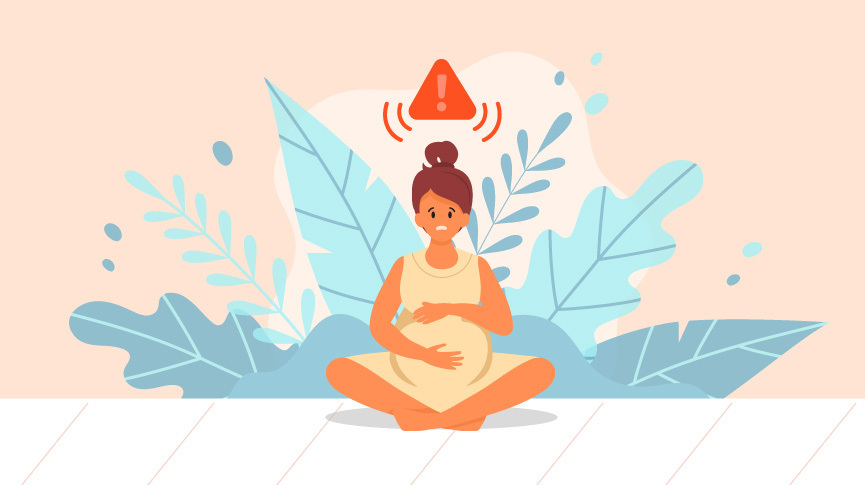Preeclampsia in Pregnancy

This article was medically fact-checked by Consultant Obstetrician and Gynaecologist Dr. Shree Datta.
Pregnancy is hard work, there’s no doubt about it.
With pregnancy, can sometimes come complications. Affecting about one in twenty pregnancies is a condition called preeclampsia. It’s important to understand what the risk factors are for this condition, what symptoms to potentially look out for, and what to do if you develop it.
What Is Preeclampsia?
Preeclampsia is essentially high blood pressure, or hypertension, during pregnancy, in someone who does not normally have HBP. This is often accompanied by damage to the liver and, or kidneys.
While pregnant people can have high blood pressure without developing preeclampsia, the condition is marked by the presence of protein in the urine. Some women can also experience swelling, but this can be normal in the later stages of pregnancy.
It typically develops after twenty weeks gestation, in the second half of pregnancy. In rare cases, it can also occur postpartum. Treatment is mainly medication to control blood pressure or in some cases, early delivery of baby.
When left untreated, preeclampsia can lead to eclampsia, a life threatening condition, characterized by seizures, liver or kidney failure, blood clotting disorders, stroke and potentially maternal death.
What Are The Symptoms Of Preeclampsia?
While some people might not notice any symptoms, there are some common ones associated with preeclampsia.
- Edema: Also known as fluid retention. This can cause swelling of the hands, feet, ankles, and face. While some edema is common in pregnancy, in the case of preeclampsia it may come on suddenly.
- Sudden Weight Gain: As a result of fluid retention.
- Headaches: That are often severe.
- Decreased Urination: Less urine than normal is coming out when you use the bathroom.
- Shortness of Breath.
- Pain: On the right side of the bottom of the ribs, right around the liver.
- Liver Dysfunction.
- Blurred Vision: That may be accompanied with sensitivity to light.
- Nausea/vomiting
Does It Affect The Baby?
Preeclampsia can affect the baby if untreated.
The condition can limit blood flow to the placenta, which may prevent the baby from receiving adequate nutrients and oxygen. This can in turn lead to growth restriction, breathing issues, and premature birth.
It also may increase the risk of placental abruption. This is when the placenta detaches from the uterine wall during pregnancy. Placental abruption can inhibit the baby from getting what it needs, and can potentially lead to miscarriage.
Risk Factors Of Preeclampsia
There are certain people who may be more predisposed to preeclampsia than others.
- Pregnant people over the age of forty, as well as teenagers.
- Multiples: If someone is having twins or more, they are at a higher risk.
- First pregnancy or a long pregnancy gap from the last one.
- Prior pregnancies with preeclampsia.
- Gestational diabetes may increase someone’s risk of developing preeclampsia.
- People with immune disorders like thyroid disease, type I diabetes, lupus and rheumatoid arthritis.
- Having a body mass index thirty or over, may increase the risk of preeclampsia.
- Genetic Factors: Some people may have a genetic predisposition to preeclampsia.
- IVF pregnancy
- Race – black women are more at risk of developing pre-eclampsia
How Do You Treat Preeclampsia?
While pregnant people with preeclampsia will be closely monitored by their provider, the main treatment is to control the blood pressure – which in some instances, is best done by having the baby.
Some providers may therefore recommend early labor induction, in order to prevent possible complications from developing.
If delivery is not an option because it’s too early for the baby, the pregnant person may be given certain medications to help control blood pressure, and prevent seizures.
When it comes to monitoring someone with preeclampsia, providers will track a patient’s blood pressure, protein levels in urine, perform blood tests to check your clotting, liver and kidney function and may also monitor the baby with ultrasounds.
Can You Prevent Preeclampsia?
Given that the cause of preeclampsia is not known, you can’t prevent it from developing. There are, however, ways you can help maintain your health during pregnancy, lessening the risk of developing preeclampsia.
- Limiting the amount of salt in your diet (this may not be recommended for all people – consult your provider).
- Choosing fresh fruits and vegetables over processed and fried foods.
- Taking any medications or supplements suggested by your doctor.
- Staying active with brisk walks, swimming, yoga, or whatever feels good for you during pregnancy.
- Getting a solid amount of rest, and elevating your feet throughout the day.
- Drink lots of water and hydrating beverages like coconut water and herbal teas (if they’re safe for pregnancy).
- Avoid or limit caffeine and alcohol – which is already recommended during pregnancy.
- Your doctor may also consider prescribing you aspirin early on in the pregnancy
- Optimise any medical conditions you have before conceiving – for example, your blood sugars if you are diabetic
When to Contact Your Doctor:
Given that preeclampsia can potentially be life threatening to both pregnant person and baby, it’s important to know warning signs for when it’s time to call your doctor.
- Blurred vision and severe headaches
- Abdominal pain/vomiting
- Very infrequent urination.
- Seizures.
- Worsening oedema
- Reduced fetal movements
Last but not least – intuition. This is your body and your pregnancy. If your intuition tells you to contact your doctor, by all means do so.
Facts Checked By:

Dr. Shree Datta is a Consultant Obstetrician and Gynaecologist in London, specialising in women’s health including all menstrual problems such as fibroids and endometriosis. Dr. Shree is a keen advocate for patient choice, having written numerous articles and books to promote patient and clinician information. Her vision resonates with INTIMINA, with the common goals of demystifying periods and delivering the best possible care to her patients.
Article written by:

Natasha (she/her) is a full-spectrum doula and health+wellness copywriter. Her work focuses on deconstructing the shame, stigma, and barriers people carry around birth, sex, health, and beyond, to help people navigate through their lives with more education and empowerment. You can connect with Natasha on IG @natasha.s.weiss.



when how to manage preeclapsia in pregnant mother and given medication mechanism of action in use that medication
I lost 3 babies over 40 years ago. Before all the medical intervention. I in reading this, I believe this was primary cause. Sad so sad.
Hi. My name isMaria D. Castro, my daughter is pregnant right now she’s 30 weeks, but she’s preeclampsia, and in the hospital,,my question is, how or what are the consequences after having preeclampsia? She had a few miscarriages, and her only daughter is now almost 17 yrs. old, but my daughter suffers pituitary gland surgery, and she has tiroide surgery too, what can she spect after the baby’s born?
Hi Maria,
thank you for reaching out. We understand and sympathize with what you have been through with your daughter. We are honored that you are considering us for the advice. But we suggest that you ask your doctor/ practitioner/ specialist, we are sure that he or she can offer an expert solution as we are not entitled to do it.
Good luck to both of you